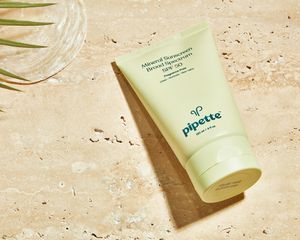:max_bytes(150000):strip_icc()/placentaskincare-0ef9b32595294c1c8e5a5bc792316b8a.jpg)
Getty
For years, the world has been reacting to using placenta in health and beauty products. Some are horrified, some are intrigued, and some are diving in face-first into all things placenta-related. Because the placenta is used in mammals to pass nutrients and oxygen from mother to fetus, the placenta has been seen as a source of nutrition. In some cultures, consuming the placenta is commonplace. Placenta creams are nourishing, anti-inflammatory, antioxidant topical serums that help the skin self-repair. In recent years, using human and animal placentas in extract form in cosmetics, like Biologique Recherche's Creme Placenta, has been tested out in the market with varying results. Wondering if placenta cream is your type of thing? Dermatologists Harold Lancer, M.D. and Hadley King answer all of your hardest questions.
Meet the Expert
- Harold Lancer, MD, is a fellow of the American Academy of Dermatology and the founder of Lancer Skincare.
- Hadley King, MD, is a board-certified dermatologist and clinical instructor of dermatology at the Weill Medical College of Cornell University.
What Does Placenta Claim Do for the Skin?
Placenta creams are created with placental extracts, which are obtained by lysing placental tissues. But it’s not the same as stem cells—the extracts do not contain cells but are rich in a wide range of proteins, minerals, amino acids, and steroid hormones that help reduce skin-developed flaws due to inflammatory issues. “According to the data of various research groups, such extracts possess anti-inflammatory, analgesic, antioxidant, cyto- and radioprotective, and anti-allergic properties and express hormonal activity, as well as stimulate proliferation and reparative processes,” King explains.
When placed in a cream, these extracts claim to moisturize, tighten and rejuvenate skin. They also reduce redness, help equalize skin color and texture, and help attain a uniform complexion.
How Are Placenta Creams Manufactured and Sourced?
If you’re worried about where the placenta comes from (or whose it is) because the word placenta gives you pause, that’s totally fair. “Placenta creams are usually sourced from high-quality animal sources such as sheep that have successfully given birth,” shares Lancer, “The discarded placenta is harvested, purified and processed into a skin-compatible product.”
Is There Scientific Evidence That Placenta Skincare Works?
Not really, and that’s due to a lack of scientific research and testing. “There is empiric evidence and clinical photographic data indicating a significant benefit from placenta cream if the product is properly created,” Lancer says. That’s a gentle way of saying that high-quality is the better way to go if you’re looking into placenta skincare. Studies showed positive effects toward wound and burn treatment with placenta creams, including the rate of epithelialization (or the beginning of the wound-healing phase) seeing a significant increase.
Are There Dangers to Using Placenta Skincare?
The lack of testing on placenta skincare should be enough to give anyone pause, with King having concerns about the hormones present in placenta possibly being the cause of some problems in potential users. Lancer says to keep an eye on that ingredient list: “Poorly-manufactured cosmetic products can lead to unwanted irritation, inflammation and lack of efficacy and results. The key is to find a proper, high-quality product.” But really, if you’re hesitant, King doesn’t blame you. “The lack of scientific evidence is also a reason to not prioritize this kind of cream when there are so many better-studied options.”
What Can You Use In Its Place?
For anyone who doesn't like the concept of placenta or is weirded out by the entire notion, there are plenty of alternative products that are scientifically tested and proven as well as dermatologist-recommended. Anything with peptides, ceramides, and vitamin/mineral compositions, like SkinMedica's TNS Ceramide Treatment Cream ($69), will replicate those high-end placenta moisturizers. Other topical anti-aging ingredients, like retinoids, antioxidants, and niacinamide, can also give you the same effect but with less danger. Unless you happen to like living on the edge, and on that, keep doing you.


